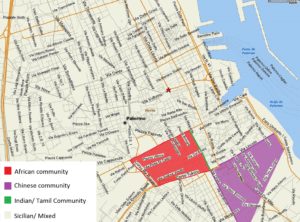Palermo has a very moved history that everyone knows about: Phoenician times, Roman Empire, Arab Conquest, Normans… We all know this part. But what about today’s Palermo? Who lives with whom and what are the problems that this leads to?
In the Palermo of 2016, we find a Chinese quarter at via Lincoln and behind the train station, a lot of Bengali shops in via Marqueda and different African populations in Ballarò. Other minorities, such as Arabs of different origins, people from the Americas or European migrants do not have a fixed spot where all of them live, they live spread across the city and often adapt so much to the original society that they are hardly distinguishable from “traditional” Sicilians.
Different groups came at different times because of different reasons, the Sri Lankan community for example came to Italy since the 1970s and mainly during the 1980s after a civil war broke out in Sri Lanka. The Tamil community (one of the populations of Sri Lanka) consists of more than 8000 people and is therefore the largest in entire Italy, you find their shops mainly in via Marqueda where the sell incense, clothing, traditional food and more, the Hindu communities also organise some festivities such as the Holi festival together, and of course, you can join. The African community is made up from people from different, mainly East African, countries. They live together in the centre of the city, mainly in Ballarò and speak there tribal languages and English or French, they own shops where you can let your hair be braided, buy and eat different African foods and buy traditional or not so traditional clothing. The members of the African community are fleeing civil war, revolution or poverty in their native countries and had to cross the desert to Libya to be illegally smuggled across the Mediterranean until their arrival in Italy. The African community in its entirety is relatively new and many of its members are fresh residents of Palermo, this community is steadily growing and its number is hard to estimate, as people come and leave and are often not properly registered. The Arab communities are divided by nationalities, they arrive in large numbers mainly from Syria, Ethiopia and Egypt, but there is also a Tunisian community in Palermo, which is a bit older and whose members often blend in with the Sicilian population. Syrians and Ethiopians are leaving their home countries in masses to flee war, dictatorship, religious fundamentalism, poverty and prosecution. Migrants from inside the European Union do defintitly exist, but the numbers are hard to estimate, as EU-citizens do not need visa or working permission to live in Palermo, it is also easier for them to come and to go.
Since the beginning of the so-called “migrant crises”, the percentage of foreign residents in Palermo increased from 5% to 25%and a city that did not know Black or Asian people is now a mosaic of ethnicities and religions.
The mayor of Palermo, Leoluca Orlando is determined to keep the mixed image of the city and supports migration and multi-ethnicity. In the “International Human Mobility Charter of Palermo” of the year 2015, he defines the right to migration as a basic human right and states that we should leave the thought, that migrants worsen the current situation, behind. Old ideas about emergency solutions without long-term consideration of the fact that people are moving because they have to, not because they want to should be left behind. We should work on a long-term solution regarding migration and how we can live together peacefully. He proposed the abolishment of the residence permit, which, according to him, only dehumanises migrants and makes people dependant on a bureaucratic process which can throw them back immensely in their process of integration.
Minors and victims of illegal trade should be given the right to be given asylum without requirement of passports or other documents and guardianship should be guaranteed fast.
Migration is considered a human right and the status of different types of migrants are defined in many different conventions and treaties, and yet, exactly these rights are often violated. States should be obliged to respect, protect and fulfil human rights, this means, state authorities are not allowed to torture or capture migrants of any kind, a state should protect migrants’ human rights by not allowing discrimination to happen, this means, that states should pay attention that migrants have the same access to work, living and other fundamental rights and investigate if human rights abuses are reported. Fulfilling human rights means that states should take positive measures to implement human rights, these measures can include consulting migrants about their needs and developing projects together and many more.
In Article 13 of the International Declaration on Human rights, it is stated that “everyone has the right to leave any country, including his own, and to return to his country“, so the right to leave is guaranteed, but unfortunately, the right to enter another country is more limited and every state can decide independently on how to deal with immigrants of different kinds.
Even though the right to migration is not guaranteed, the right to seek asylum is (Article 14 of Universal Declaration on Human rights). Everyone has the right to seek for protection in another state and states are even obliged to help and protect refugees, as they are not voluntarily finding the decision to migrate.
If you are part of a different culture or are interested in cultures, you are very much invited to our festival: “Meet me Halfway” which will take place from 23rd to 25th of september.

